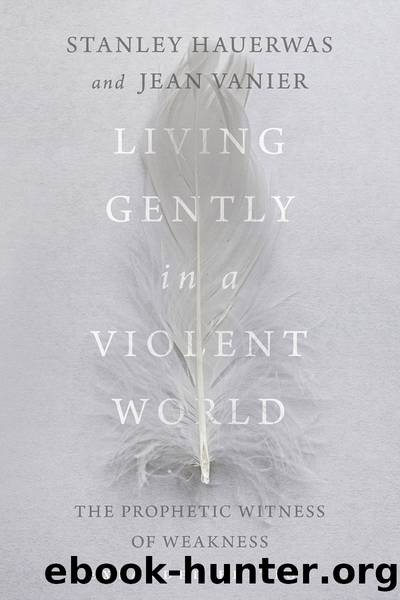Living Gently in a Violent World: the Prophetic Witness of Weakness by Stanley Hauerwas

Author:Stanley Hauerwas
Language: eng
Format: epub
Tags: disability;disabled;disability studies;community;Christian community;church;violence;church and mission;church and society;Christians;l'arche;power;authority;weakness;weak;gentleness;gentle;disabled Christians;Christians and disability;church and disability;disability and the church;Christianity and disability;disabled community;differently abled;ableist;able bodied
ISBN: 9780830873913
Publisher: InterVarsity Press
Published: 2018-03-15T00:00:00+00:00
WE CAN DO NOTHING ON OUR OWN
When we listen to stories of terrible pain and know we canât do anything about it, we touch our own vulnerability. We have heard the scream of pain, but we donât know what to do with it. None of us knows what to do with the deep brokenness of our world. Maybe that realization can bring us back to community. We can do nothing on our own. We need somewhere to be together.
I recently came across some very strong words by Martin Luther King Jr. He said something like this: âHow hard it is for people to live without someone to look down uponâreally to look down upon. It is not just that they feel cheated out of someone to hate. It is that they are compelled to look more closely into themselves and what they donât like in themselves.â Itâs obvious that we are all a mixture of light and darkness; we have all touched the places of hypocrisy and lies. All of us have felt that tendency to want to prove that we are better than others, to go up the ladder, to be respectedâeven in LâArche. Anywhere.
But as we live with people who have been crushed, as we begin to welcome the stranger, we will gradually discover the stranger inside of us. When we welcome the broken outside, they call us to discover the broken inside. We cannot really enter into relationship with people who are broken unless somehow we deal with our own brokenness. I am not saying that we all have to go through psychotherapy. But what are we hiding? Or what are we hiding behind? We must discern our natural inner protectiveness and compulsive attitudes. Somewhere we are hiding our weaknesses.
And yet weakness is an important part of our reality. We were born weak. We needed unconditional love. We needed our mums to say, âYouâre more beautiful than I expected,â or âItâs good that you exist; you are unique.â One of our assistants reported that sheâd heard a mother say to her child, âI would have aborted you if I could.â Memories like this are very deep in the hearts of people, just as they are in children who were abused sexually. They can produce a fundamental breakage. We all have a deep fear of our own weaknesses because my weakness is what makes it possible for someone else to crush me. So I create mechanisms of defense and compulsion to protect myself. We all have protective systems designed to prevent people from seeing who we are.
While weakness can be beautiful, it can also be terribly dangerous. I can understand the immense pain of parents. Recently a father asked me to go and see his wife. She was forty years old and eight months pregnant. She was in tears and a bit hystericalâthis was her first baby and she knew that the child had a disability. I saw immediately that I couldnât say a word to her. There are times when you must not say nice words.
Download
This site does not store any files on its server. We only index and link to content provided by other sites. Please contact the content providers to delete copyright contents if any and email us, we'll remove relevant links or contents immediately.
The 5 Love Languages: The Secret to Love That Lasts by Gary Chapman(9792)
The Space Between by Michelle L. Teichman(6932)
Assassin’s Fate by Robin Hobb(6200)
Wiseguy by Nicholas Pileggi(5770)
Everything Happens for a Reason by Kate Bowler(4734)
Gerald's Game by Stephen King(4642)
Pillow Thoughts by Courtney Peppernell(4272)
A Simplified Life by Emily Ley(4158)
The Power of Positive Thinking by Norman Vincent Peale(4062)
Harry Potter and the Prisoner of Azkaban (Book 3) by J. K. Rowling(3355)
Resisting Happiness by Matthew Kelly(3337)
Girl, Wash Your Face by Rachel Hollis(3282)
Being Aware of Being Aware by Rupert Spira(3272)
The Secret Power of Speaking God's Word by Joyce Meyer(3184)
The Code Book by Simon Singh(3180)
More Language of Letting Go: 366 New Daily Meditations by Melody Beattie(3024)
Real Sex by Lauren F. Winner(3014)
Name Book, The: Over 10,000 Names--Their Meanings, Origins, and Spiritual Significance by Astoria Dorothy(2980)
The Holy Spirit by Billy Graham(2944)
